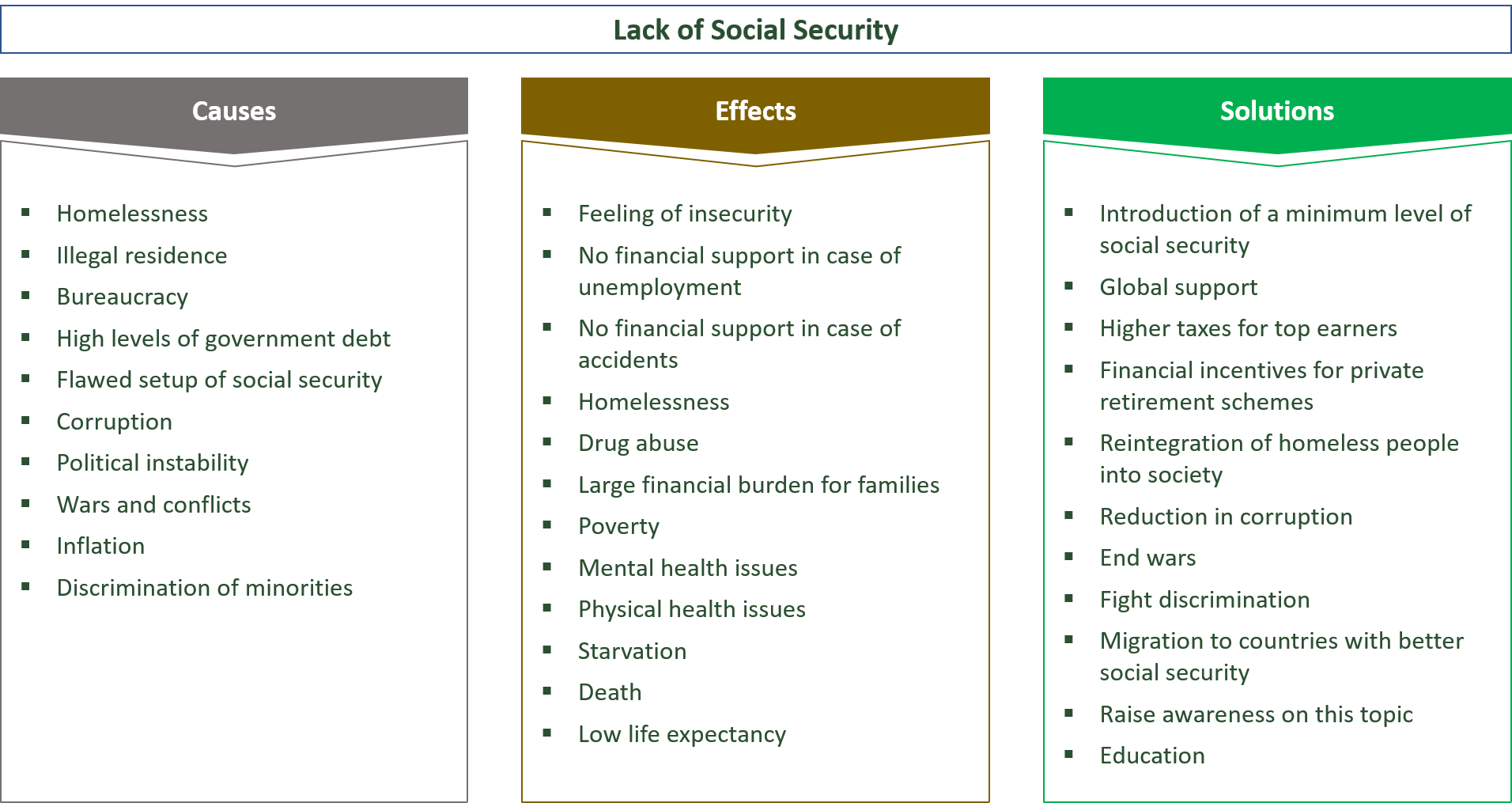“More young people believe they’ll see a U.F.O. than that they’ll see their own Social Security benefits.”
Mitch McConnell, Politician
Lack of Social Security: Causes, Effects & Solutions

Social security can be defined as a system managed by the government that ensures the monetary support for people with no or only insufficient financial measures.
Social security is one of the most basic forms of security, however, in many countries worldwide, there is a significant lack of social security, which can cause several adverse effects for the local population.
In this article, the extent, causes, effects and solutions regarding a lack of social security are examined.
Audio Lesson
Contents
Why is Social Security important?
- Feeling of security for the general public
- Security in case of inability to work
- Reduction of social tensions
- Social responsibility
- Prevention of financial burden for family members
- Higher life expectancy
- Lower risk for homelessness
Feeling of security for the general public
Through an advanced social security scheme, the general public can feel quite safe since they know that they will be covered by social security in case of a serious adverse event like accidents or other things that make it impossible for people to earn money.
Thus, the local population will have a higher quality of life since they do not have to worry too much about the future due to a sufficient level of social security.
Security in case of inability to work
Since unemployment is a big problem in many regions worldwide, social security can cover people in those regions and supply them with the most basic goods so that these people do not have to suffer from hunger and starvation.
Moreover, these people also do not have to worry too much about becoming unemployed since they know they are covered, which may make it easier for those people to perform at their jobs since their mind is free to really focus on their work to accomplish things.
Reduction of social tensions
Social tensions often occur in regions with a high level of poverty and insufficient social security.
People are often desperate and frustrated due to their adverse living conditions.
In many cases, people will also suffer from serious hunger and starvation.
These people are often quite eager to engage in criminal activities since they see no alternative to earn money in order to survive and to provide for their families.
In those regions, sufficient social security can lower the social tensions and also crime rates since people get a minimum amount of financial support so that they are able to buy food and other basic things for their daily life.
Social responsibility
Humanity should also feel obliged to provide a minimum level of living standard, even for the poorest among us.
Thus, it should be our social responsibility to make sure that everyone, independent of the country they are born in, has the chance to get basic education and to have enough financial measures to afford enough food.
Therefore, the introduction of proper social security schemes is crucial to ensure this supply with basic things worldwide.
Prevention of financial burden for family members
Proper social security can also be a financial relief for family members.
Especially in poor countries, many people even struggle to earn enough money to supply themselves with food and basic things for daily life.
If a family member needs financial support, this often imposes a large financial burden for the rest of the family.
Thus, by introducing proper social security schemes, family members would be relieved from this financial burden.
Higher life expectancy
The level of social security and life expectancy are closely connected.
This is quite logical since people who are not covered by social security are much more likely to suffer from starvation or health issues since they will often not be able to afford medical treatment.
It is therefore crucial to introduce social security for everyone on our planet so that the life expectancy for the global population can be increased.
Lower risk for homelessness
People who are not covered by social security also have an increased risk for homelessness.
If these people become unemployed, they will likely no longer be able to pay their rent and may lose their home.
Thus, in order to reduce homelessness, it is also crucial to introduce basic social security for the general public around the globe.
Extent of the lack of social security worldwide
According to the World Social Protection Report 2017/2019 of the International Labor Organization, less than half of the world population is effectively covered by social security.
55% of all people on our planet are left unprotected, which amounts to around 4 billion people.
The coverage with social security is even worse for children.
Only 35% of all children are effectively covered by effective social security schemes, while almost two-thirds of all children, which amounts to 1.3 billion children, are left out from social security.
This problem is especially severe in Asia and Africa where the vast majority of children suffer from a lack of social security.

Causes for a Lack of Social Security
- Homelessness
- Illegal residence
- Bureaucracy
- High levels of government debt
- Flawed setup of social security
- Corruptive systems
- Political instability
- Conflicts
- Inflation
- Discrimination of minorities
Homelessness
Homelessness can be a significant cause of a lack of social security.
Homeless people do not have a permanent residential address, which makes it hard for them to communicate with official authorities.
This in turn may lead to difficulties since if official authorities are not able to communicate with you, chances are that your application for housing will be declined.
Moreover, homeless people often lose the motivation to change their life after a while since they simply lose all their hope for a better life, which may lead them to ignore appointments with official authorities, which in turn may lead to a loss of social security.
Illegal residence
Illegal immigrants also likely suffer from a lack of social security since they simply do not have official permission to stay in the respective country and may therefore often be not eligible for social security.
These people often hide from official authorities since they fear being sent back to their home country.
Thus, these people will suffer from serious issues once they become sick or need financial support since no one will support them due to their illegal residence status.
Bureaucracy
For some people, also the high level of bureaucracy will make it hard to get social security.
Especially for people who are not able to speak the local language, filing all these forms may be too difficult and these people may lose their right for social security payments due to that.
Moreover, people who lack basic education may also not know the process chain to get social security and these people may get stuck in bureaucracy, which may exclude them from proper social security.
High levels of government debt
In countries with a high level of government debt, there are often no or just insufficient social security schemes in place since these countries are often not able to financially afford the introduction of proper social security.
Therefore, people living in these countries may suffer from a significant lack of social insurance and the related adverse effects.
Flawed setup of social security
It is crucial that a social security scheme is set up in a way that it is sustainable in the long run.
This includes taking into account the development of demographic factors and the overall financial prospects of a country.
However, many countries often introduce social security schemes that are not sustainable and run out of money in the long run, which increases government debt and in turn reduces the ability to provide social security for the general public.
Corruptive systems
In countries with corruptive political systems, the general public often suffers from a lack of social security since the money that should have been spent on social insurance is often rather spent by a minority of rich political elites on some prestige projects instead of improving the living conditions of the general public.
Political instability
Many countries worldwide suffer from a high level of political instability, meaning that the local population often does not accept the current regime and aims for a change in the political system.
However, under those circumstances, it is quite hard to sustain a proper social security system since political stability is a prerequisite to supply the general public with social insurance.
Conflicts
Many people who suffer from conflicts are forced to leave their homes in order to survive and to find a better future in other countries.
However, these people will have a quite hard time since they often do not speak the language of the country they want to migrate to.
In turn, it will be quite hard for them to get a job and also to strive for social security.
Making things worse, these people are often illegal immigrants and may not be eligible for social security at all.
Inflation
Inflation can also indirectly lead to a lack of social security.
People who live in a country with a high inflation rate will often suffer from insufficient income since the money they are getting is depreciating in value every day.
Thus, also social security will become worth less and less every day, up to the point where people will no longer be able to afford basic things like food if inflation levels are high enough.
Discrimination of minorities
In some countries, there is still significant discrimination against minorities.
These minorities will have a quite hard time since they will have many disadvantages in several parts of their daily life.
If the level of discrimination is sufficiently high, they may also not be eligible for social security and may suffer from the adverse effects related to a lack of social security.

Effects of a Lack of Social Security
- Feeling of insecurity
- No financial support in case of unemployment
- No financial support in case of accidents
- Homelessness
- Drug use
- Large financial burden for families
- Poverty
- Mental health issues
- Physical health issues
- Starvation
- Low life expectancy
Feeling of insecurity
A lack of social security can lead to a significant level of insecurity for the local population.
Imagine you live in a country with no social security and you know that in case you suffer from any event that prevents you to make money, you may no longer be able to afford basic things for your daily life, including sufficient food.
Would you feel comfortable living under those conditions? I don’t think so.
However, this is the reality for billions of people worldwide.
Apparently, due to this high level of insecurity, also the quality of life for those people will be quite low since they will often worry about how their future will look like.
No financial support in case of unemployment
In case of unemployment, you will be in quite a bad shape if you do not live in a country with proper social security.
In this case, you may no longer be able to afford housing or to by basic food items, which may lead to serious health issues or even to death if the level of starvation becomes too bad.
No financial support in case of accidents
Accidents may also lead to a state where you will no longer be able to work and earn money.
For instance, imagine you are involved in a car accident and may become disabled due to that.
In this case, you will have a quite hard time finding a job, especially in areas with high levels of unemployment.
Without sufficient social security, you will be in big trouble since you will likely not be able to make enough money to buy food or other basic things for daily life.
Homelessness
Homelessness is also directly related to the absence of social security.
Many people who become unemployed or are no longer be able to work due to other reasons may no longer be able to pay their rent and lose their homes due to that.
These people will often also not be able to find a new home since they will not be able to pay for it.
If those people do not have relatives or friends who take care of them, their chances of homelessness will be quite high.
Drug use
In an indirect manner, a lack of social security may also contribute to the drug problem.
For instance, if you become unemployed and are not able to find a new job, you may also lose your home since you may no longer be able to afford it.
Due to frustration and desperation, you may decide to numb yourself with drugs to withstand your situation.
However, in the long run, this may lead to addiction and related problems.
Large financial burden for families
In countries with no official social security schemes, children are often regarded as a sort of social security once their parents retire.
However, if children have to provide for themselves and also for their parents, chances are that they have to work quite hard and their quality of life may be quite low due to that.
Moreover, in many cases, if these children become unemployed, the whole family will suffer from financial shortages, which may translate into starvation or even death.
Poverty
People may also slide into poverty due to a lack of social security.
Imagine you have a good job and earn a decent income.
Due to an accident, you will no longer be able to work in this job and you may also not be able to find a new job anymore.
In turn, you may no longer be able to pay rent and may lose your home.
Moreover, you will also no longer be able to buy sufficient food.
Making things worse, if you are homeless, it will be quite difficult for you to apply for social security, since you will often not be able to communicate to authorities in a suitable manner without a permanent residential address.
All this may trap you in a vicious circle of a lack of social security and poverty, from which it may be quite hard to escape from.
Mental health issues
A lack of social security and the worries people may have due to that may also translate into significant mental issues, including depression and other mental health problems.
Moreover, once people become unemployed and are not able to get financial support from the government, they may feel quite helpless, which may further increase the chance for mental issues.
Additionally, if you are no longer able to buy sufficient food, your brain may not get enough minerals and vitamins, which may further lead to mental problems for the respective people.
Physical health issues
A lack of social security may not only lead to mental, but also to physical public health issues.
For instance, if you are no longer able to buy enough food due to a financial shortage, you may suffer from a lack of vitamins and other essential components, which may in turn hurt your body and your organs.
In the long run, a lack of vital minerals may even lead to serious health issues like heart attacks and strokes.
Starvation
Especially in poor developing countries, a lack of social security also often leads to starvation.
Many people will simply not be able to provide their families with a minimum amount of food due to extreme poverty.
If there is no financial support from the government, these people may suffer from severe levels of hunger and the related horrible consequences.
Low life expectancy
All the issues related to a lack of social security mentioned before lead to a significantly lower life expectancy for people compared to the life expectancy of people living in countries with sophisticated social security schemes.
It has been shown by many studies that the life expectancy of people living in poor countries is significantly lower compared to the life expectancy of people in rich developed countries.

Solutions for a Lack of Social Security
- Introduction of a minimum level of social security
- Global support
- Higher taxes for top earners
- Financial incentives for private retirement schemes
- Reintegration of homeless people into society
- Reduction in corruptive systems
- End conflicts
- Fight discrimination
- Migration to countries with better social security
- Raise awareness on this topic
- Education
Introduction of a minimum level of social security
Every government around the world should aim to introduce at least a minimum level of social security.
By doing so, the local population can at least be sure that they get basic financial assistance in case they need it.
This basic assistance should include financial measures for sufficient food supply and should also ensure housing so that people are not at danger to become homeless once they lose their job.
It should also be assured that pensioners get sufficient support if their pension is not high enough to cover basic needs for daily life.
Global support
Countries all over the world should work together to end poverty and also to ensure a minimum level of social security in each country worldwide.
This could come in the form of financial subsidies of rich developed countries for poor developing countries which would not be able to provide social security for the local population without the support of third parties.
By financially supporting these poor countries, social security standards could be raised significantly.
Higher taxes for top earners
In some countries, a small percentage of people often earn quite a high income and also owns almost all of the country’s wealth.
In those countries, politicians should consider increasing the wealth or income tax in order to redistribute money from the rich minority to the poor majority of the local population.
This money that comes from higher taxes may also be used to improve social security standards and therefore to reduce the number of people who suffer from a lack of social security.
Financial incentives for private retirement schemes
Governments should also consider providing people with an incentive to engage in private retirement schemes.
By doing so, fewer people would be dependent on social security once they retire since their pension levels would be higher with additional private retirement schemes.
Reintegration of homeless people into society
We also have to provide homeless persons with the opportunity to get back to normal life.
This should include the support to find a flat and also support with all the bureaucratic stuff.
Homeless people are often simply overwhelmed by their problems and do not see a way out of their misery.
By supporting them, we could offer those people the opportunity to get back into social security and in a better life.
Reduction in corruptive systems
In countries where corruptive actions are still a big problem and people suffer from a lack of social security due to that, governments and local authorities should take action to reduce this problem.
This could also include that other countries stop trading activities with countries that are known for high levels of corruptive political systems.
By doing so, the financial pressure on these countries to change their political structure would increase.
End conflicts
Since conflicts and the related migration issue are a big cause for a lack of social security, it is crucial to end these conflicts all over the world.
By doing so, people will not have to migrate to other countries and could stay in their home country.
In order to end these conflicts, global cooperation is crucial to increase the pressure on countries to behave in a peaceful manner.
Fight discrimination
In countries where discrimination is a serious cause for a lack of social security, state officials and also celebrities should raise the awareness on the problem of discrimination and should make a stand for a more liberal society.
By doing so, the acceptance in the local population may increase towards these minorities.
In turn, these minorities will have it easier to find suitable jobs and to be covered by proper social security.
Migration to countries with better social security
For people in countries with no social security at all and also no prospects to change the system, it might be tempting to move and migrate to other countries with better social security conditions.
Depending on the qualification, these people might find a better future in other countries since they may be socially protected.
Raise awareness on this topic
The lack of social security is still a big issue in many poor developing countries.
However, our global population is often not even aware of the issue.
Thus, it is crucial that we raise awareness of this topic through social media or other communication channels, so that the pressure on governments increases to introduce proper social security schemes.
Education
It is also crucial to raise the education levels of the general public.
Only then will it be possible for those people to recognize how important social security really is.
These people may be more eager to demonstrate for their rights, which in turn increases the pressure on governments and may force politicians to introduce social security schemes in those countries.
Conclusion
In many countries worldwide, the lack of social security is still a big problem.
This is especially true in poor developing countries in Asia and Africa.
It is estimated that around 4 billion people do not have proper social security.
It is therefore crucial that governments around the world take action to mitigate this problem.
Only then will it be possible to achieve higher levels of protection for billions of people and therefore to increase their quality of life.
Sources
https://en.wikipedia.org/wiki/Social_security
https://www.investopedia.com/terms/s/socialsecurity.asp
https://www.ilo.org/global/about-the-ilo/newsroom/news/WCMS_601903/lang–en/index.htm
https://www.nytimes.com/2019/06/21/your-money/social-security.html?ref=oembed

About the author
My name is Andreas and my mission is to educate people of all ages about our environmental problems and how everyone can make a contribution to mitigate these issues.
As I went to university and got my Master’s degree in Economics, I did plenty of research in the field of Development Economics.
After finishing university, I traveled around the world. From this time on, I wanted to make a contribution to ensure a livable future for the next generations in every part of our beautiful planet.
Wanna make a contribution to save our environment? Share it!
